Show messages:
1-14
…
355-374
375-394
395-414
415-434
435-454
455-474
475-494
…
1855-1859
Thread Split: Some posts in this thread have been moved here
From: speedy (AL2000)
Hello Friends ,
a lot of Node, so much patience but,
In the end , I think it was worth the Pen.... , as Pilou says , it's like as charm....
Tasselate a dome,
steel frame and glasses , triangular parametric pattern
link:http://www.mediafire.com/file/if8a4mq3loacywn/Dome_Tasselation.rar
best
al
From: Frenchy Pilou (PILOU)
That's Richard Buckminster dome! ;)
But seems there is something to increase!
If I am not wrong seems only 5 levels of triangulation are possible?
So maybe an another algorithm to find ?
And a complet dome ?
A truncated dome with Top/Bottom size circle variable ?

Ps Make a space inside the address link! ;)
so your link becomes (more speedy for user! ;)
link:
http://www.mediafire.com/file/if8a4mq3loacywn/Dome_Tasselation.rar
Colors with
script: /* Random Styles existing to Selected faces & edges */ var styles = moi.geometryDatabase.getObjectStyles(); var breps = moi.geometryDatabase.getObjects().getBReps(); for ( var i = 0; i < breps.length; ++i ) { var brep = breps.item(i); var edges = brep.getEdges(); for ( var j = 0; j < edges.length; ++j ) { edges.item(j).styleIndex = Math.floor(Math.random() * styles.length); } var faces = brep.getFaces(); for ( var j = 0; j < faces.length; ++j ) { faces.item(j).styleIndex = Math.floor(Math.random() * styles.length); } }
Render with the free Simlab Ccomposer Lite (max 1920 * 1080)
http://www.simlab-soft.com/3d-products/simlab-composer-lite.aspx
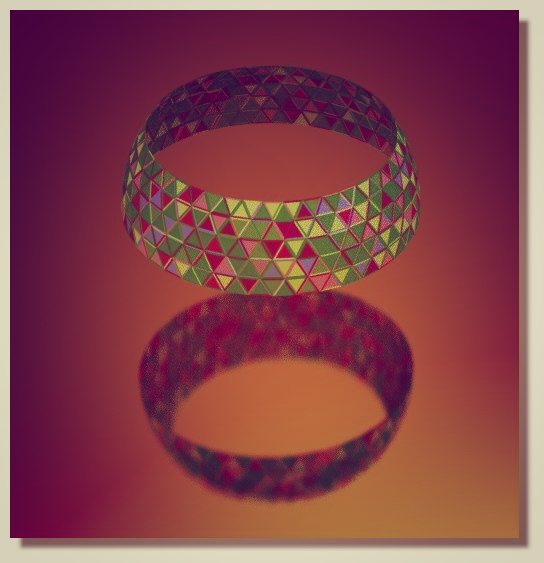
From: mkdm
Pilou...your imagination is limitless!! :)
See you.
From: speedy (AL2000)
Hi Pilou
The tapping levels I have achieved
they are n° 5 ... but they can be increased ....
So, the dome can be closed...
In any case, if you scroll through the file you will see that there is a tight link
Between the radius of the dome and the number of sides of the damping-
Without any inspiration, I started Tasselate
the dome with Equilateral triangles, using the height of the
Themselves that intersects with the semisphere and so on....
Have a nice day
al
From: Frenchy Pilou (PILOU)
Cool but i don't want to code! ;) (for the moment)
(if you can give me the line transformed! ;)
PS will be inestimate if you replace edges by cylindric structures and real nodes of junction! ;)
You can of course simplify!

Message 7777.420 was deleted
From: Frenchy Pilou (PILOU)
Cool! :)
with the colors functions of Moi! (see 3 posts previous)
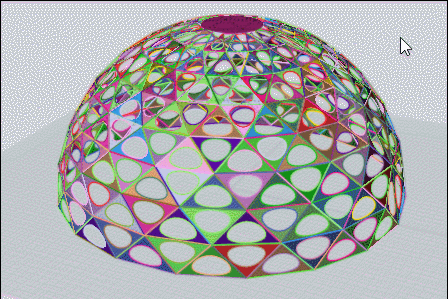
From: speedy (AL2000)
Hi James and Friends ,
I am very happy with your sharing-
I hope that in the future, others will do the same ,
I would not wish that we were just the voices of the chorus-
Good work
al
From: Karsten (KMRQUS)
Hello Al,
it seems that there is a big Inhibition to use and play with the elephant. So someone has to be the "primus inter pares".
Have a nice day
Karsten
p.s.: ... better five lions than 500 sheep. (from Rambo III) lol
Message 7777.424 was deleted
From: Frenchy Pilou (PILOU)
Cool!
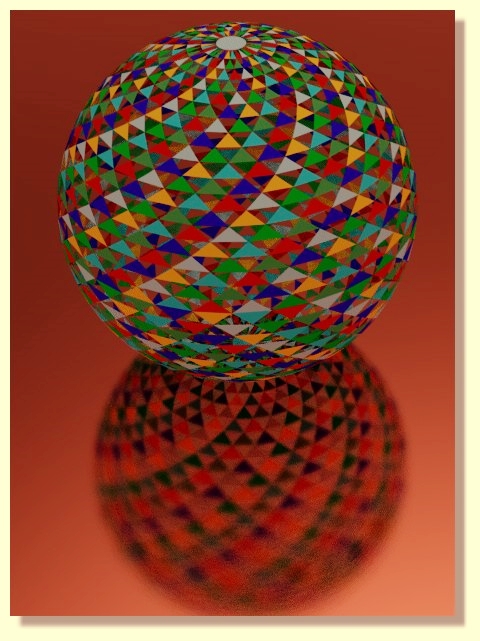
From: James (JFH)
Hello All,
I found a grasshopper youtube tutorial by Wissam Wahbeh
inspired by the cathedral of St.Mary of the Assumption, San Francisco,
Designed by Pier Luigi Nervi and Pietro Belluschi.
https://www.youtube.com/watch?v=o4ufv13EZk4


Nodeeditor process has next to nothing in common with grasshopper steps shown in the video;
it was more about reproducing the end result.

James
Image Attachments:
 images.jpeg
images.jpeg
 NerviBelluschi.jpg
NerviBelluschi.jpg
 Unknown.jpeg
Unknown.jpeg
From: Frenchy Pilou (PILOU)
Sorry seems i have not the "Mirror" node !
Your script is for the Official or Modified Elephant ?
Will be fine to have a list of existing nodes! ;)
Something like...(it's an old one)
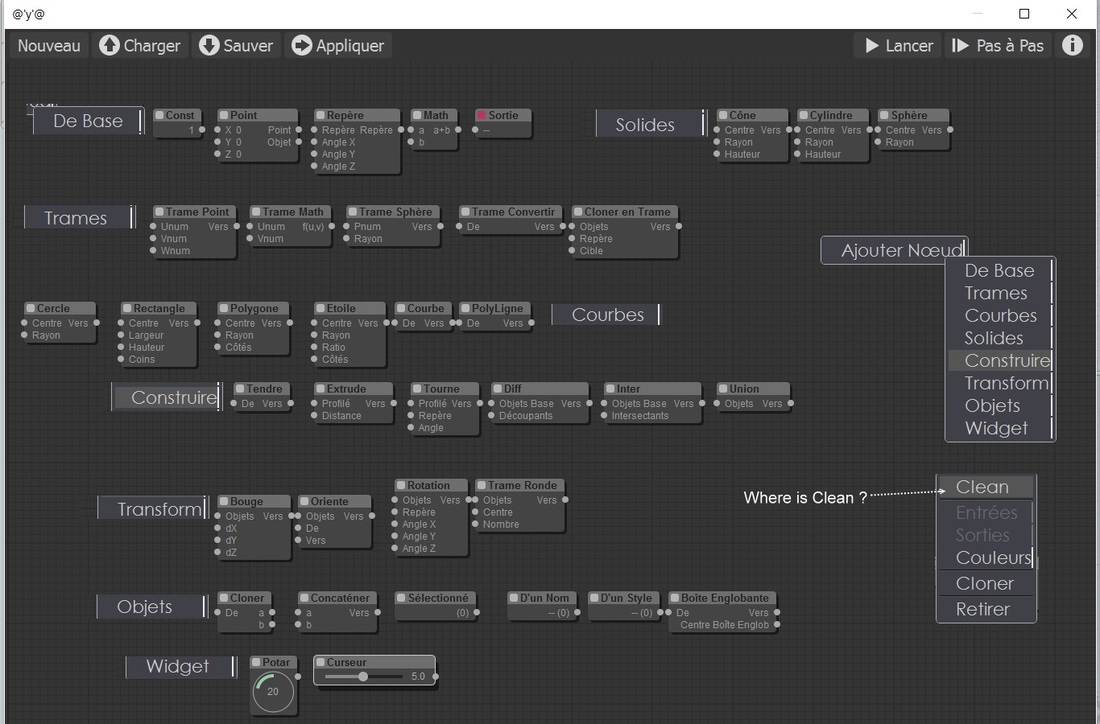
From: James (JFH)
Hi Pilou,
Sorry I forgot that Mirror was a new node. It can be found here
http://moi3d.com/forum/index.php?webtag=MOI&msg=7777.335
otherwise I am using latest mod. It can be found here
http://moi3d.com/forum/index.php?webtag=MOI&msg=8197.7
James
From: speedy (AL2000)
Hello James
Well done James
nice definition_
I saw that, together with Karsten, you defined
a new way to handle points (multiple inputs for Polyline)
I have to do and I have not dealt with the topic ...
You can briefly let me know what you got
with Point Split node
I've seen formulas on the outbound links from the node.....
Thanks in advance for the info
Good afternoon
al
From: Frenchy Pilou (PILOU)
Thx!
More easy with mirror inside! ;)
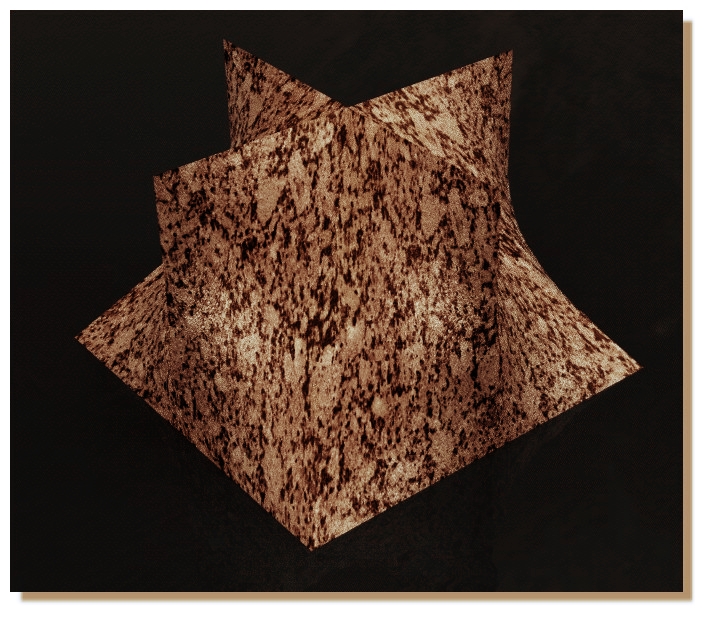
From: James (JFH)
Hello Al,
<<let me know what you got with Point Split node>>
The SplitPts / PointsExt pairing breaks what would be
one contiguous point array into a series of discreet arrays,
so as a consequence you get separate polylines instead of
one with linking diagonals. Try bypassing these 2 nodes to
see their effect.
<<I've seen formulas on the outbound links from the node.....>>
the inputs to PointExt (xLength, zLength) determine the points
at which to break original point arrays into series of new point arrays.
I hope this helps.
Let me know if greater clarification is necessary.
James
P.S. New Version using logic nodes for odd number generation attached to earlier post
Message 7777.432 was deleted
From: speedy (AL2000)
Hi james
Thanks a lot for the info you gave me, I saw that
You have also updated the latest files.
Try to understand this method,
even if at first I do not think it's so easy-
I'm used to, with grasshopper to use data,
which may be flat or branched,
I do not know if I can fully understand the potentialities, the outputs of the
Node Split Point (x-length) - (y- length) and (z -length) and mode
in which to operate to branify them
What I understand and that each output alters the Array data in the three
components ...
Graphically, x width, depth y, z height
But how to work with math data is another music ...
Maybe you could send me some basic examples
"Very simple ", to understand the mechanism effectively
Thanks again..... and have a nice day
al
From: Karsten (KMRQUS)
Hello Al,
it isn't so complicated than it looks;-)
If you have a pointarray with e.g. 40 points as an input for e.g. a curve the curve will be drawn from point to point, if the xLength is 40. But if the xLength is 10 and the zLength is 4 you will get 4 independent curves with 10 points in each curve.
It is an internal mechanism or meta information to organize point sequences. Some of the nodes can evaluate this an can process the right result. E.g. the bundle node generates this meta information automatically - for the concate nodes it is difficult to generate this data, because the inputs can have different length and the node will be used for different jobs.
If you want to have a look to this data you can use also the arraylogger ->scroll down, at the end there are the infos.
Have a look into the waveproto1.nod file

The point values in the info panel shows the changes - here you get 6 curves with each curve has 7 control points, without that, you will get one curve with 6*7=42 control points:-(
That was the problem here.
Have a nice day
Karsten
Image Attachments:
 xLength.png
xLength.png
Show messages:
1-14
…
355-374
375-394
395-414
415-434
435-454
455-474
475-494
…
1855-1859








![]() images.jpeg
images.jpeg
![]() NerviBelluschi.jpg
NerviBelluschi.jpg
![]() Unknown.jpeg
Unknown.jpeg



![]() xLength.png
xLength.png